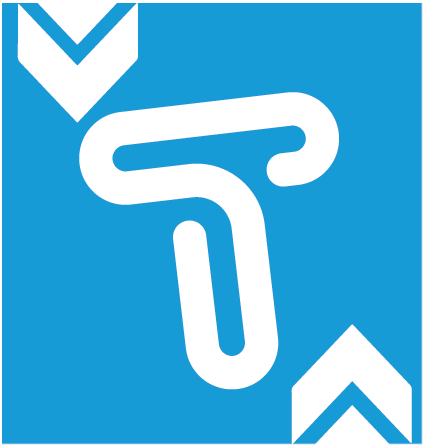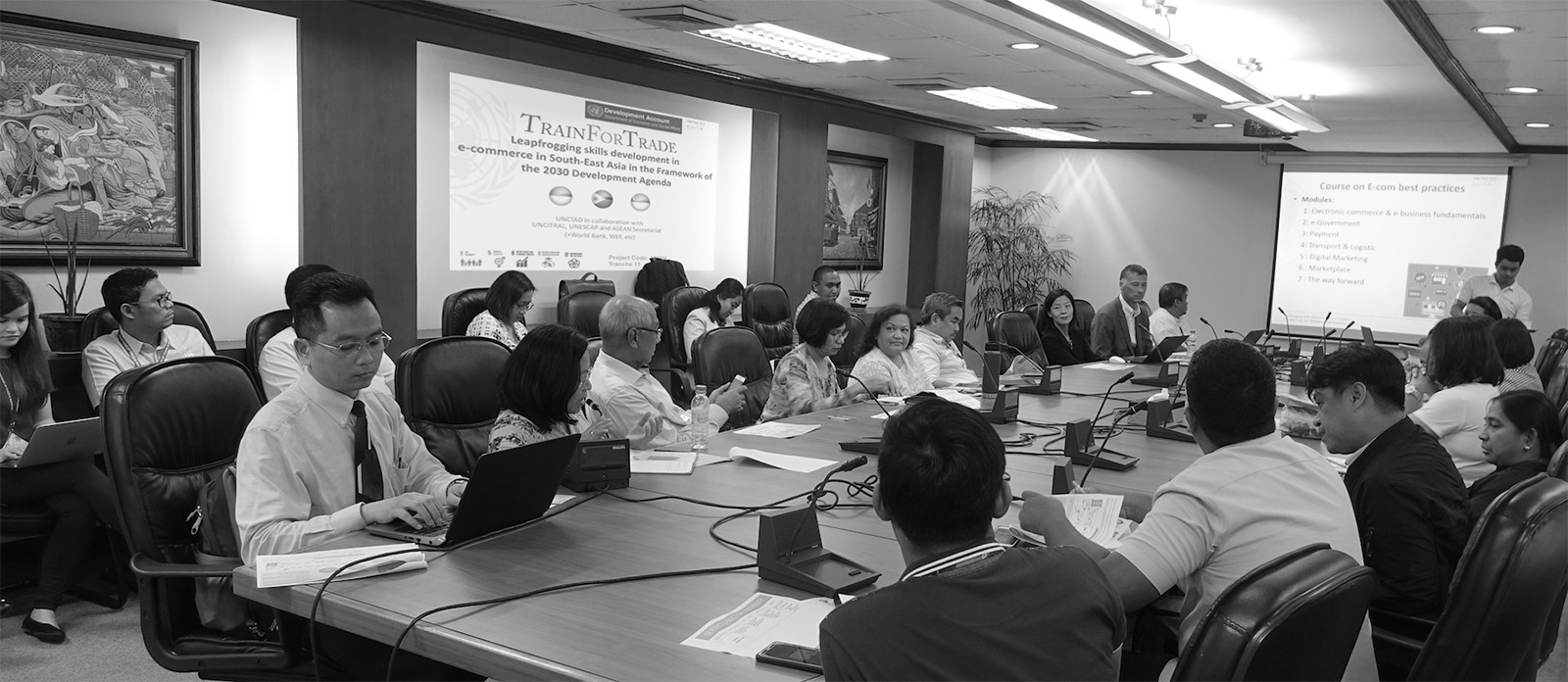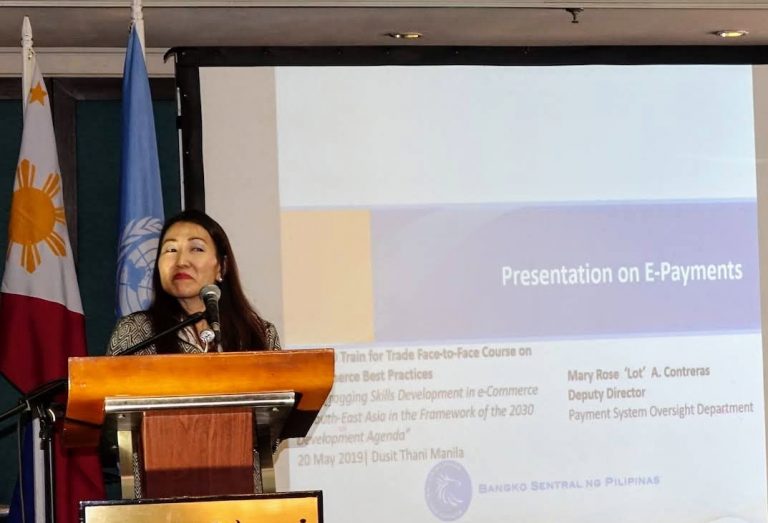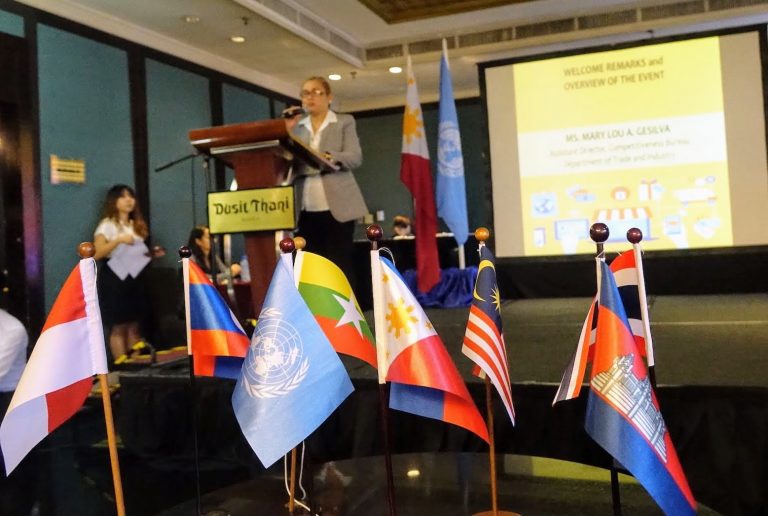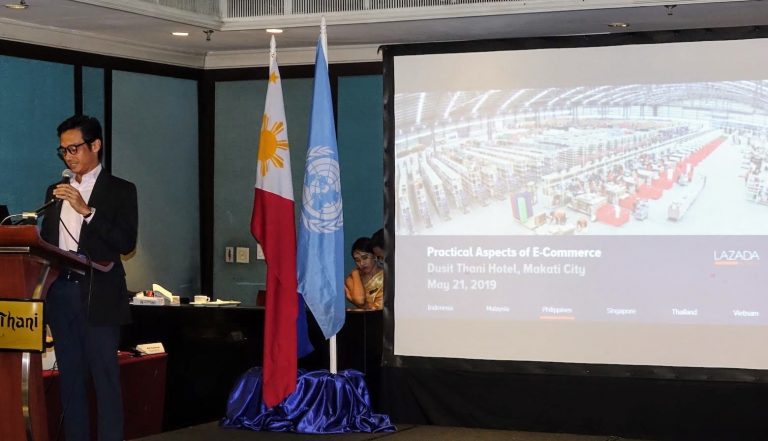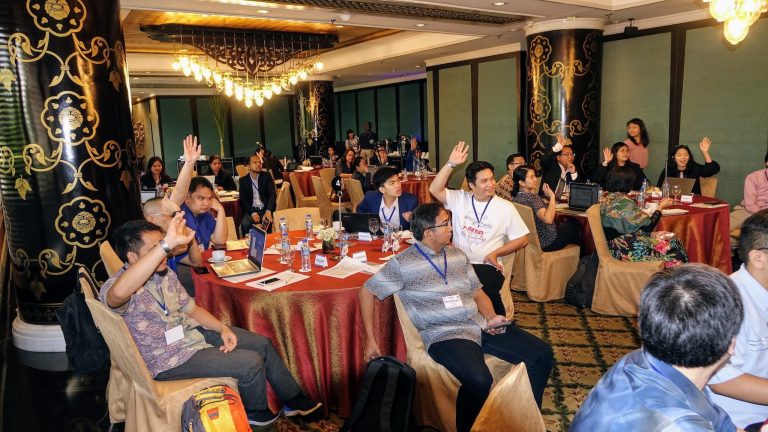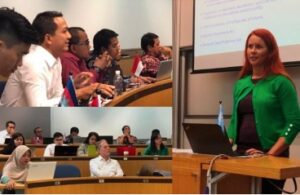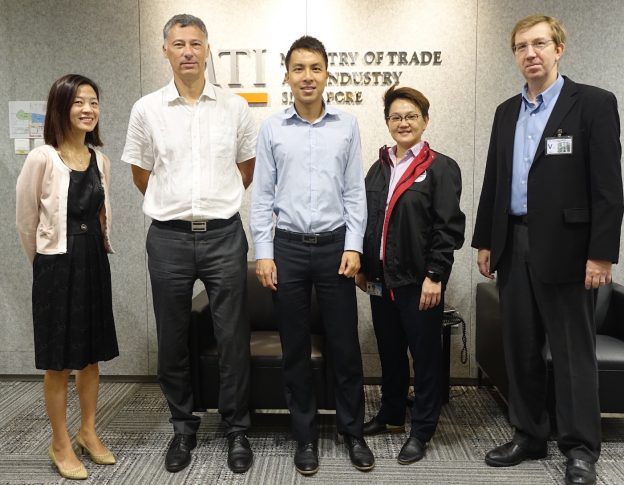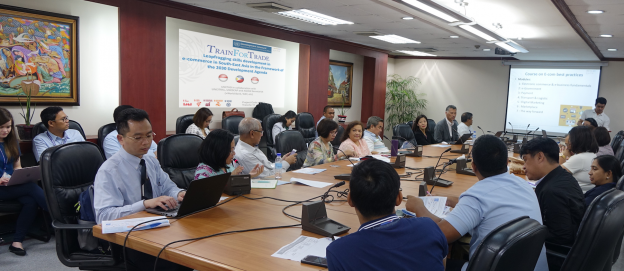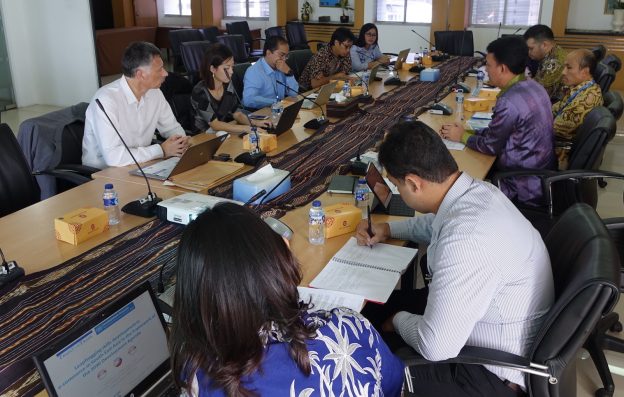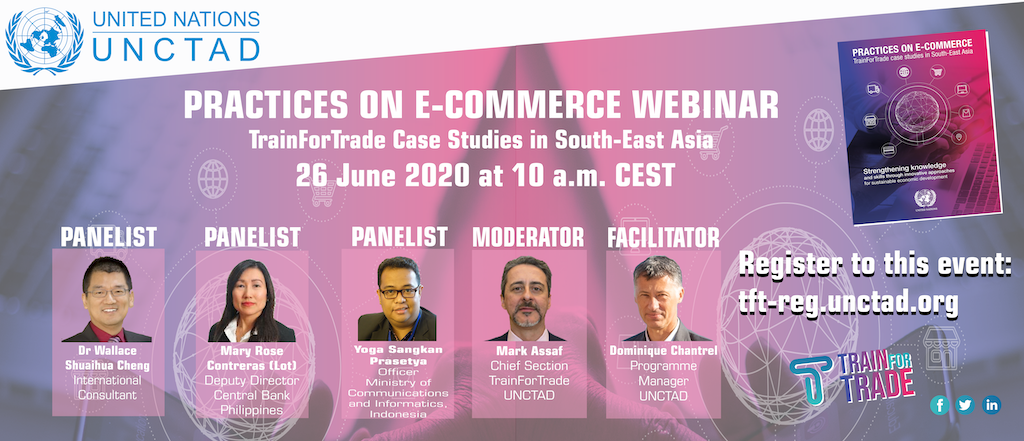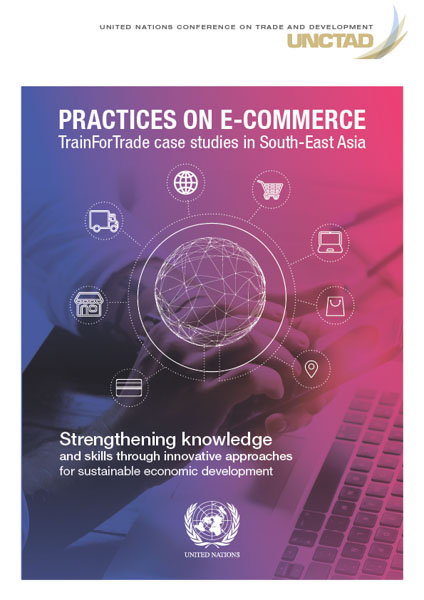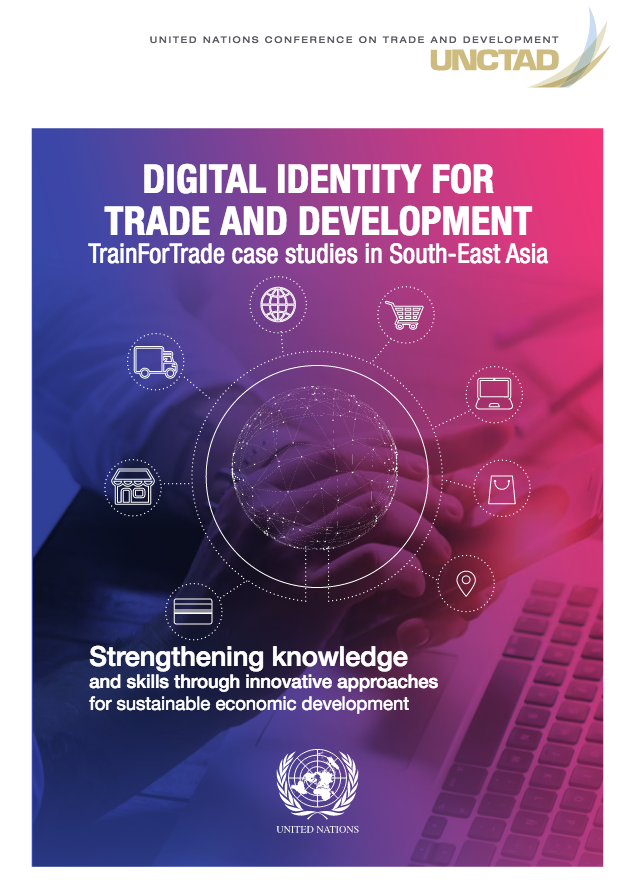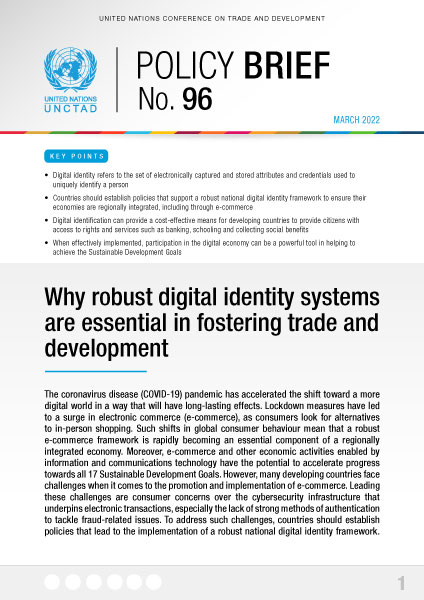Leapfrogging skills development in e-commerce in South-East Asia in the Framework of the 2030 Development Agenda
Overview
Leapfrogging skills development in e-commerce in South-East Asia in the Framework of the 2030 Development Agenda
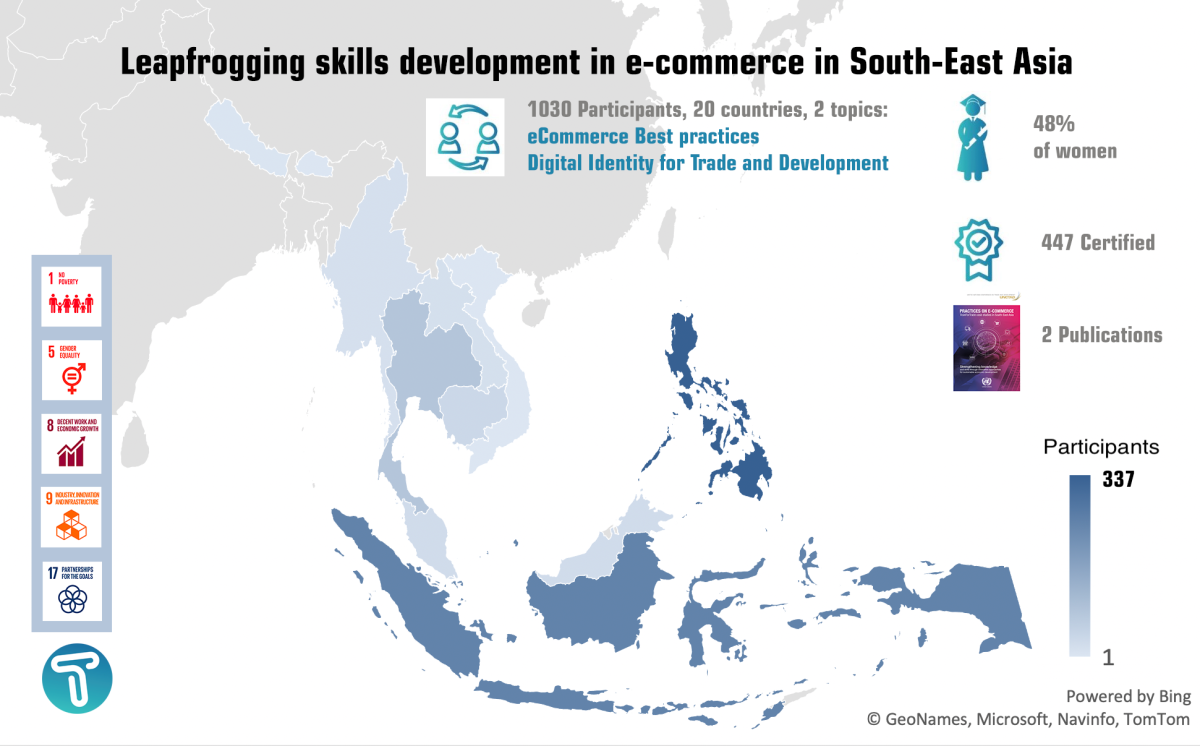
Project Code: 1819N, Tranche 11
Planning
2018
- Invitation of relevant stakeholders in “one venue”
- Development of the blended learning courses on Digital Identity for Trade and Development
- Update and adaptation to the region of the blended learning course on e-commerce best practices
- on-line workshop on e-commerce best practice
2019
- On-line workshop on Digital Identity for Trade and Development
- E-commerce Best Practice follow-up workshop
- Digital Identity for Trade and Development follow-up workshop
2020
- Produce publication on e-commerce best practices
- Produce publication on Digital Identity for Trade and Development
- Webinar for the launch of the publication
2021
| Date | Activities | Comments |
|---|---|---|
| 12 April – 21 May | On-line course on eCommerce Best Practices | With UNESCAP |
| 24-28 May | Follow-up webinar eCommerce Best Practices | With UNESCAP |
| 1 May-30 May | Development of a course element on Digital Trade Agreements under the Digital Identity for Trade and Development | With Singapore Consultant |
| 30 May – 2 July | On-line delivery course on Digital Identity for Trade and Development | With UNESCAP, UNCITRAL and WB |
| 2 July | Policy brief on Digital Identity for Trade and Development | |
| 5-9 July | Follow-up webinar on Digital Identity for Trade and Development | With UNESCAP, UNCITRAL and WB |
| 6-9 December | Hybrid restitution workshop to discuss and validate the policy proposals related to the two components (e-Commerce, Digital Authentication for Trade and Development), in Jakarata | With Indonesia |
- End of the project: December 2021

Objectives:
- To increase knowledge on the practical e-commerce best practices to address the challenges outlined in the roadmap
- To translate the international best practices in e-commerce into a national policy and to adapt them to the national and regional framework
- To build up SMEs expertise in the field of best practices for e-commerce and to increase their participation in the digital economy
Target Population:
- Ministries in charge of e‐commerce, Telecommunication/ICT, Trade, Revenue/ Tax/Finance authorities
- Business wo/men involved in e-commerce
- NGOs, banks and service providers who want to improve and develop their business in e‐commerce
Modules:
- Electronic commerce & e-business fundamentals
- e-Government
- Regulatory framework
- ICT tools
- Payment
- Logistics
- Marketing
- The way forward
Gallery
(click to enlarge)

A DACUM session on Digital Identity was held on 18th and 19th September in UNCTAD’s HQ. The purpose of this exercise, called Design a Curriculum (DACUM), as part of the TrainForTrade methodology, is to conduct brainstorming with subject matter experts (World Bank, World Economic Forum, the Republic of Estonia, Rajah & Tann Singapore LLP, Access Now, University of Lausanne) in order to define the objectives and contents of the course to be developed, including the training objectives, identify the target population, describe the value of the training to the participants and design the test for each objective and finally to sequence the course objectives and group them into modules to form the curriculum.
Objectives:
- Draft policies on digital identity for trade and development
- Identify limits of data protection and digital identity
- Define the scope of digital identity governance
- Evaluate risks and solutions related to digital identity for trade and development
Target Population:
- Policy makers: Ministry of interior, Ministry of Justice, Ministry of Finance, Financial regulators, Ministry of Trade/Commerce, Ministry of ICT
- Private sector: Chamber of commerce, Business cluster (ICT, FinTech, etc.…)
- The institution in charge of issuing authentications, Postal services, Financial institutions and Telecom companies
Modules:
- Fundamental Concepts of Digital Identity
- Data Protection
- ID Usage
- Governance
- ID Technology Solutions & Risks
- Digital Trade Agreements
Gallery
(click to enlarge)
Needs Assessment undertaken in 3 countries:
- Presentation of the project to national stakeholders
- Identification and meeting with local focal point(s)
- Research of local best practices to update, improve and tailor-made the course materials
- Pre-selection of potential participants (but not only in the capital of each country)
Results
Expected results
- Organized online deliveries of the course E-commerce Best Practice and the course on Digital Identity for Trade and Development
- Organized a regional face-to-face workshop for each of the components (e-Commerce Best Practices, Digital Identity for Trade and Development)
These workshops enabled the selected participants from Indonesia, the Philippines and Singapore to: – Further elaborate on the knowledge acquired from the e-Learning courses – Use this knowledge to explore policy channels that can be practically applied in their countries to boost their e-Commerce adoption efforts. – These workshops were also open to other ASEAN member countries (no dedicated funding) - Compilation and publication of selected case studies were produced as an outcome of the workshops
Participants from the beneficiary countries were tasked with developing case studies on how to leverage their newly enhanced knowledge to contribute to reduce existing challenges in their country and provide policy recommendations that can be advanced at the national and regional levels. – The best case studies written by training participants are compiled and featured in a publication on e-Commerce and Digital Identity for Trade and Development in South-East Asia. Access to the published cases >>>
In 2021
- Through this project, (1030 participation) 765 trade operators from the ASEAN region from 20 countries have improved their knowledge and capacity in the two areas of eCommerce Best Practices (608 participation, 52% of women) and Digital Identity for Trade and Development (422 participation, 43% women). Some participants may have participated in more than one event, it is define as participation.
- Organize on-line deliveries of the course E-commerce Best Practice and the course on Digital Identity for Trade and Development
- Organization of a regional workshop to discuss and validate the policy proposals related to e-commerce and digital authentication
Selection of participants to review and validate the policy proposals that were advanced in the case studies. The workshop will also be open to the ASEAN Secretariat and partners; as well as other interested ASEAN member countries that took part in the previous courses delivered.
Beneficiary countries background
Indonesia
- The projections estimate that the volume of business of e-Commerce will grow up to $130 billion by 2020
- One of the Mobile-first Nations in Asia with 70% Internet traffic
- The government has adopted an E-Commerce road map for 2017-2019 on 8 key areas: Education, HR Development, ICT Infrastructure, Logistics, Cyber Security, Funding, Taxation, and Consumer Protection
- The main priorities in the field of cyber security are: personal data protection, digital identity, and digital literacy regarding cyber security
Philippines
- The government has designed the Philippines e-Commerce Roadmap 2016-2020 (PECR 2016-2020)
- Objective: 100’000 Micro, Small & Medium Enterprises participating in e-commerce
- Priorities: Fighting cybercrime and full implementation of the e-Government scheme
- • Main challenges: digital authentication which hampers government’s efforts to fully implement e-Government as physical documents are still required and there is a “lack of a single identification card to identify a citizen”
Singapore
- A Smart Nation: E-Commerce market is growing fast, they have high speed and good ICT infrastructure
- The volume of business of on-line shopping was at $1.1 B in 2010, it grew to $3.5 B in 2014. It is expected that this volume will grow up to $46.3 B by 2020
- 1 strategic national project is the development of the National Digital Identity (NDI), which will allow citizens and businesses to transact online in a convenient and secure manner
Videos
UNCITRAL and Digital Identity
UNESCAP and Digital Identity
Hybrid restitution 2021
Opening remarks from Ms. Ibu KUAI, Ambassador Indonesia to the United Nations in Geneva
Opening remarks from Ms. Valerie Julliand, Resident Coordinator, United Nations in Indonesia
Opening remarks from Ms. Mira Tayyiba, Secretary-General, Ministry of Communications and Informatics, Indonesia (MCI)
Related documents


Currently on a Project Page


